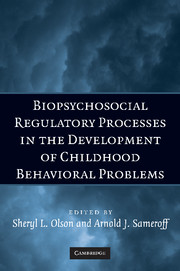Book contents
- Frontmatter
- Contents
- Preface
- Contributors
- 1 Conceptual Issues in Studying the Development of Self-Regulation
- 2 How Gene-Environment Interactions Can Influence the Development of Emotion Regulation in Rhesus Monkeys
- 3 Context Matters: Exploring Definitions of a Poorly Modulated Stress Response
- 4 An Integrative Approach to the Neurophysiology of Emotion Regulation: The Case of Social Withdrawal
- 5 Regulatory Competence and Early Disruptive Behavior Problems: The Role of Physiological Regulation
- 6 Behavior Regulation as a Product of Temperament and Environment
- 7 Self-Regulatory Processes in the Development of Disruptive Behavior Problems: The Preschool-to-School Transition
- 8 Emotional Dysregulation and the Development of Serious Misconduct
- 9 Regulatory Processes in Children's Coping with Exposure to Marital Conflict
- 10 Family Subsystems and Children's Self-Regulation
- 11 Culture and the Development of Regulatory Competence: Chinese–U.S. Comparisons
- 12 Self-Regulation and the Development of Behavioral and Emotional Problems: Toward an Integrative Conceptual and Translational Research Agenda
- Index
- References
1 - Conceptual Issues in Studying the Development of Self-Regulation
Published online by Cambridge University Press: 02 July 2009
- Frontmatter
- Contents
- Preface
- Contributors
- 1 Conceptual Issues in Studying the Development of Self-Regulation
- 2 How Gene-Environment Interactions Can Influence the Development of Emotion Regulation in Rhesus Monkeys
- 3 Context Matters: Exploring Definitions of a Poorly Modulated Stress Response
- 4 An Integrative Approach to the Neurophysiology of Emotion Regulation: The Case of Social Withdrawal
- 5 Regulatory Competence and Early Disruptive Behavior Problems: The Role of Physiological Regulation
- 6 Behavior Regulation as a Product of Temperament and Environment
- 7 Self-Regulatory Processes in the Development of Disruptive Behavior Problems: The Preschool-to-School Transition
- 8 Emotional Dysregulation and the Development of Serious Misconduct
- 9 Regulatory Processes in Children's Coping with Exposure to Marital Conflict
- 10 Family Subsystems and Children's Self-Regulation
- 11 Culture and the Development of Regulatory Competence: Chinese–U.S. Comparisons
- 12 Self-Regulation and the Development of Behavioral and Emotional Problems: Toward an Integrative Conceptual and Translational Research Agenda
- Index
- References
Summary
The romantic myth of literary genius which has long promoted an effortless and unfathomable Shakespeare, cannot easily accommodate a model of a Shakespeare whose greatness was a product of labor as much as talent. The humbler portrait of Shakespeare…is of a writer who knew himself, knew his audience, and knew what worked.
(Shapiro, 2005, p. 303)The capacity for self-regulation is a hallmark of successful development. People engage in a variety of interactions with the physical, cognitive, and social world that require responsiveness to the actions of others while at the same time making a variety of choices. The agentic aspect of this engagement is understood as self-regulation. Although the construct of self-regulation originated in general systems theories whose concern was the complexity of bidirectional part-whole relationships in biology and physics, the adoption of the construct by developmental psychologists has tended to isolate the part from the whole, so that regulation is seen as a trait of the individual, rather than the result of the individual's experience with the context of development. Understanding self-regulation as intertwined with experiences in the social context will produce more accurate scientific predictions as well as more efficient intervention programs to improve children's behavioral problems.
Human self-regulation ultimately means knowing one's self, knowing one's context, and knowing how to interact with that context to achieve individual goals.
Information
- Type
- Chapter
- Information
- Biopsychosocial Regulatory Processes in the Development of Childhood Behavioral Problems , pp. 1 - 18Publisher: Cambridge University PressPrint publication year: 2009
References
Accessibility standard: Unknown
Why this information is here
This section outlines the accessibility features of this content - including support for screen readers, full keyboard navigation and high-contrast display options. This may not be relevant for you.Accessibility Information
- 21
- Cited by
